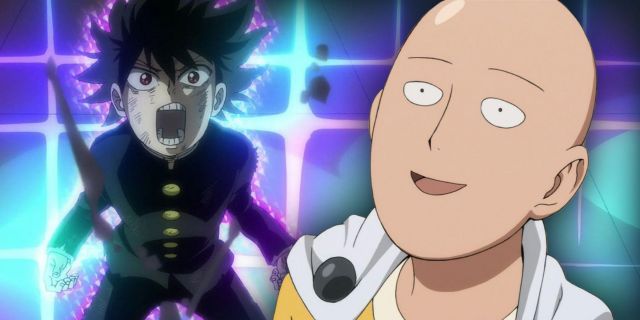There seems to be a wide-ranging belief that a protagonist can’t be too strong without consequences for the story’s ability to engage its audience. Take Superman for example – many believe he just isn’t interesting because his overpowered strength deflates all tension from conflicts and overall makes him a boring character.
Yet for the mangaka ONE, author of both One-Punch Man and Mob Psycho 100, overwhelming, unfair strength is used as the core behind each series’ protagonist and is a major factor in why these characters are so captivating. Shigeo “Mob” Kageyama and Saitama are the strongest characters in their respective universes, yet they still deal with their own journeys and developments that remain engaging because of their power, not just despite it. Here’s how ONE keeps the overpowered protagonist from being boring, and how they are used enhance the stories they come from.
Mob’s Powers Help Him on His Journey to Self-Acceptance

Mob doesn’t have the same kind of unlimited power that Saitama has, but he is by far the strongest character in the Mob Psycho 100 universe and is rarely put into physically dangerous situations. Instead, Mob’s fights with other espers and spirits are reflections of his own inner conflicts that all connect back in some way to his psychic powers. In Season 1, Mob learns to accept that his abilities don’t make him a special person but are instead just another skill that a person can develop and use. In Season 2, Mob accepts his powers can be used to help others and begins to use them to connect with other psychics and help them through their issues.
In the final arc of Mob Psycho 100 Season 3, Mob must come face to face with himself and finally accept his powers for what they are. He understands that emotions and powers aren’t something to be repressed or feared; they are important pieces of who he is. By accepting his powers, Mob begins to love himself and completes his journey of self-growth into a confident, happy young man. Mob’s arc through the series remains interesting because of how his power functions as a mirror for his emotional states. Though he is challenged by opponents like Mogami and the Claw organization, the audience never really fears that Mob is in danger. Instead, his own reaction to his power — and how it affects the characters in the world around him — are the sources of the show’s heart and drama.
Saitama’s Strength Shows Him Power Isn’t Everything

Saitama takes the overpowered protagonist character model and throws it through a brick wall. There’s never any tension to his battles because his whole gimmick is that he is always able to win. Yet despite this premise, One-Punch Man knows when to take itself seriously and still provides engaging story arcs that go beyond just simple action gag comedy. The clearest way it does this is by creating side characters like Garo and Genos; these are the more typical battle manga protagonists whom the audience can relate to, struggling in fights and getting clear motivations to get stronger.
However, Saitama himself also has a slowly developing arc and emotional moments that are based around his strength. He lacks purpose and motivation, having fulfilled his goal of becoming the strongest at the start of One-Punch Man. He struggles to care about his surroundings because there is no danger to him, and this affects his general relationships with other people. Saitama’s story is about finding a purpose in life beyond just power, such as becoming a better hero. Despite having unlimited power, he’s often tardy to a battle or gets distracted by some petty endeavor that costs lives and property damage, like when he arrives too late to save his friend and disciple Genos from Garo. As his carelessness affects the few things he cares about in his life, Saitama begins to learn what it means to be a real hero.
Both Mob Psycho 100’s Mob and One-Punch Man’s Saitama are interesting characters in beloved franchises, and the investment they create in their audience directly relates to their power. They demonstrate how being overpowered doesn’t necessarily have to mean a lack of tension and conflict, and their stories show ways to write overpowered action characters in ways that can still connect to the audience. Overwhelming strength doesn’t have to be boring; instead it can just be another character trait used to service a story.















Leave a Reply